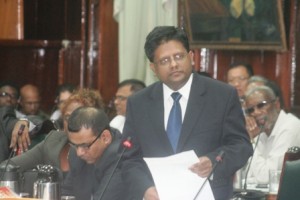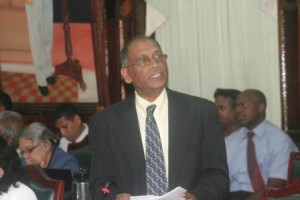BY MICHAEL YOUNGE –
Consideration of the budget estimates has been delayed after the opposition used its one-seat majority to vote down government’s proposal to start the examination process on Wednesday in the 65-seat National Assembly. The opposition also rearranged the order of how the agencies will be dealt with and set a seven-day time-table instead of six as was proposed by the government.

The 26-seat A Partnership for National Unity and seven-seat Alliance For Change forced the Parliament to adjourn its business on Wednesday, delaying the work of the Committee of Supply which is tasked with scrutinising the estimates of the various budget agencies.
As a result of the 33-31 votes in this case, Parliament will meet on Monday, April 15, to begin scrutiny of the budget and its estimates.
This process is expected to wind up on April 23, according to documents seen by this newspaper.
Opposition Leader David Granger told Guyana Times International on Tuesday afternoon that the opposition wanted more time to carefully scrutinise the budget proposals of the government. He said too that the opposition was in no hurry to approve the budget, given the fact that it had until April 30 to do so in accordance with the Constitution.
Granger did not specify whether a formal request of this nature had been made at the commencement of the debate and it was largely speculated that the APNU wanted to delay the consideration of the estimates given the personal problems being encountered by some opposition MPs which made their attendance uncertain.
This would have affected the opposition’s ability to make any changes to the estimates as it indicated earlier.
Admitting that numbers were important at this particular juncture, Granger played down any thoughts of the APNU and AFC misusing their majority or seeking to delay the consideration of the estimates for sinister reasons.
Opposition’s abuse of extremely slender majority
However, Finance Minister Dr Ashni Singh who spoke with this publication after the adjournment of Parliament on Wednesday expressed disappointment and worry over the decision taken by the APNU and the AFC on what he called a very simple matter. “What we have witnessed here is yet another example of the opposition’s abuse of its extremely slender majority in this House,” Dr Singh submitted.
“I say this because since time immemorial this Parliament has abided by the customs and practices that following the general policy debates comes immediately thereafter consideration of the national estimates… this is a practice that has never been deviated from… it is a practice in fact the opposition never irrespective of whether they had a majority or minority was never raised before… they didn’t raise it last year… the matter for a need for a break,” he contested.
The minister was adamant that something was amiss even though he tried to restrain himself from making the obvious political deduction from the opposition’s position on the matter.
Pure rigidity
Dr Singh maintained that the opposition demonstrated pure rigidity on the core matters related to the consideration of the budget estimates, leaving no room for flexibility or compromise.
He called their behaviour “alarming”, reporting that the one-seat majority vote was used both at the level of the business sub-committee, the Committee of Supply and the National Assembly.




